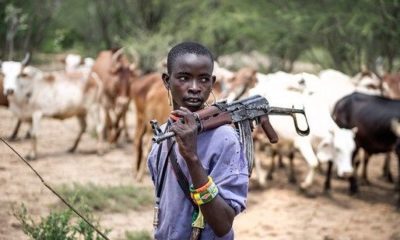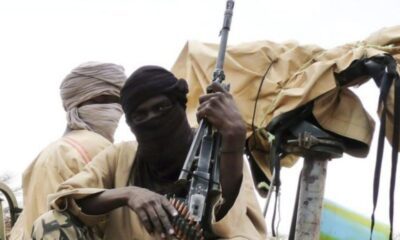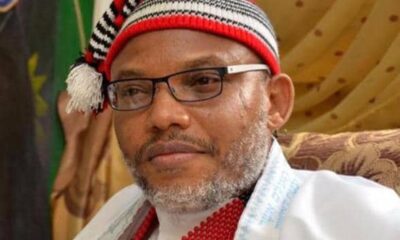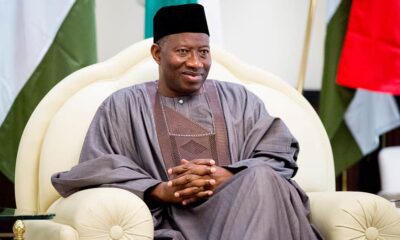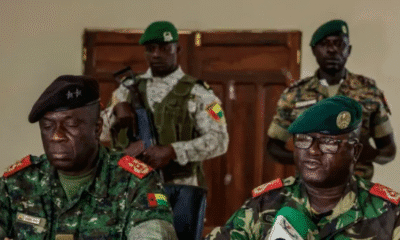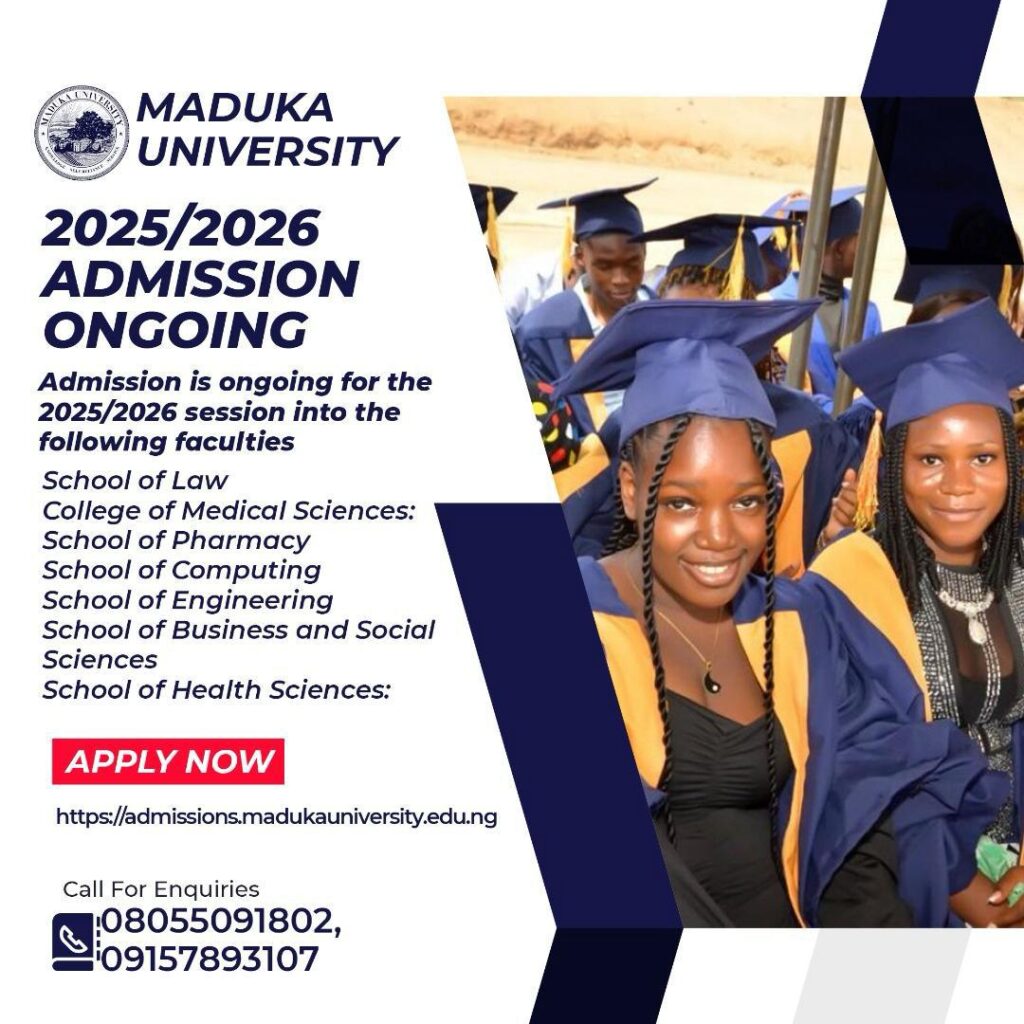
Politics
Is Muftwang the man to unify Plateau APC?
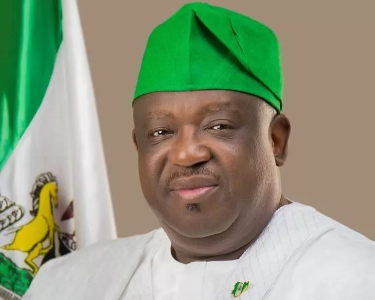
By Imman Onye
As political permutations ahead of the 2027 general elections intensify, discussions within Plateau’s power blocs suggest that the possible defection of Governor Caleb Mutfwang from the Peoples Democratic Party (PDP) to the All Progressives Congress (APC) could trigger one of the most dramatic realignments in the State’s recent political history.
Reports indicate that despite its formidable national presence, the APC in Plateau has remained deeply fractured since 2023, when internal rivalry between key blocs weakened its cohesion and contributed to electoral setbacks. The three dominant tendencies—the Rescue Team loyal to former Governor Simon Lalong, the Generation Next movement built around former governorship candidate and current APC National Chairman, Prof. Nentawe Yilwatda, and the Legacy/Founding APC bloc comprising old ACN, CPC, and ANPP structures—have operated in silos, frequently clashing over leadership, nominations, and control of party machinery.
Party insiders say these divisions persist even with Yilwatda’s elevation to National Chairman, as mistrust and unresolved 2023 grievances continue to hinder consolidation.
Analysts now believe that Mutfwang’s possible entry into the APC could provide the missing neutral centre capable of harmonizing these rival tendencies. His growing cross-party appeal, legal triumphs, and governance style marked by inclusiveness and reconciliation have earned him credibility beyond party lines.
“If Mutfwang joins, he will come in as a neutral arbiter—someone who can blend the Rescue, Generation Next and the legacy forces into one formidable political machinery. That’s what the APC needs to secure a smooth victory in 2027,” a party source disclosed.

With Yilwatda seen as “the son of the soil” at the national level and Mutfwang commanding strong grassroots legitimacy, party loyalists are already projecting a united APC capable of sweeping federal and state positions in Plateau.
However, political observers caution that entrenched interests within both the APC and PDP may resist such a move, fearing loss of influence. Yet, they concede that Mutfwang’s bridge-building credentials could make him the decisive factor in Plateau’s evolving political chessboard.
As 2027 approaches, one thing appears clear: Plateau is bracing for a realignment that could either heal old wounds or completely redraw the State’s political boundaries.
Politics
Soludo will join APC soon, says Orji Kalu
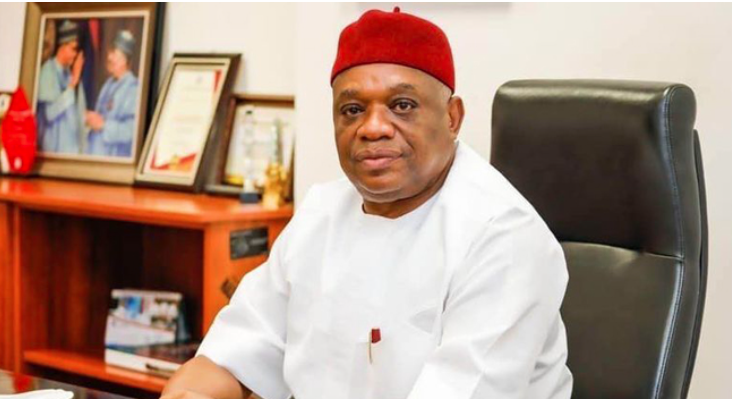
Senator Orji Uzor Kalu has predicted that Anambra State Governor, Charles Chukwuma Soludo, will soon defect to the ruling All Progressives Congress (APC), describing him as a natural progressive whose ideals align with those of President Bola Ahmed Tinubu.
Kalu, a former Abia State governor and current senator representing Abia North, made the remark while speaking with journalists at the National Assembly in Abuja on Monday.
He said Soludo, who is currently a member of the All Progressives Grand Alliance (APGA), would eventually find political alignment with the APC once ongoing legal issues are resolved.
“Soludo is a progressive like President Tinubu, like me, like the Senate President. He has no alternative but to join us in the APC,” Kalu said.
The senator noted that several governors and politicians across Nigeria were already gravitating toward the ruling party, attracted by what he described as President Tinubu’s visionary and inclusive leadership style.
He added that no one was being coerced into joining the APC.

“No one is forcing anybody to join the APC — not me, not the Senate President, not even the President. People are coming on their own because they see the direction of progress,” he stated.
Kalu, a key figure within the APC since its formation, said he was committed to strengthening the party’s influence in the South East ahead of the 2027 general elections.
He also pledged support for his younger brother’s political ambitions under the APC platform while ruling out backing any candidate from other parties.
Turning to national politics, Kalu reaffirmed his support for the Tinubu administration, expressing confidence that ongoing reforms would stabilise the economy and restore public confidence.
“At the beginning, there were rumours about moves to remove the Senate President, but as you can see, everything is calm. The Senate is united and focused on passing laws that will help President Tinubu deliver on his agenda,” he said.
On the current economic hardship, Kalu admitted that Nigerians were facing difficulties but urged patience, insisting that reforms such as fuel subsidy removal and exchange rate unification would yield results in the medium term.
“As a businessman, I feel the pain but also see the progress. The macroeconomic indicators are improving, though the micro level remains tough. The key challenge now is ensuring that relief reaches the masses,” he explained.
Assessing the political landscape ahead of 2027, Kalu said President Tinubu remained the most dominant figure in Nigerian politics.
“The 2027 election will be Tinubu versus Tinubu,” he declared. “There is no cohesive opposition. Our party is strong, grounded, and with the people.”
Kalu, who maintains close ties with American politicians, also addressed the controversy surrounding US President Donald Trump’s recent comments about violence in Nigeria.
He said Trump’s remarks on religious killings were not misplaced, adding that both Christians and Muslims continued to suffer from extremist attacks.
“Let’s be honest, what Trump said is not a lie. Nigerians are being killed whether they are Christians or Muslims,” he said. “If they attack in Plateau, the victims are mostly Christians; in Zamfara, they are Muslims. These people are terrorists and must be called by their name.”
Kalu revealed that he had spoken with two former US presidents and more than 60 lawmakers in Washington, who expressed willingness to support Nigeria’s counter-terrorism efforts. He said the recent increase in Nigerian Air Force operations might be connected to intelligence sharing with the United States.
He, however, criticised the US and its allies for contributing to regional instability following the fall of Libya’s Muammar Gaddafi and Iraq’s Saddam Hussein, saying the resulting arms proliferation worsened Africa’s security challenges.
Despite the security and economic pressures, Kalu maintained that Nigeria was on a path to recovery.
“The government is taking the right steps, and I believe President Tinubu will overcome these challenges,” he said.
Politics
Trump: Only terrorist sympathisers fear US strikes in Nigeria —Ex-Army commander, Henry Ayoola

A former Commander of the Special Task Force, Operation Safe Haven, Maj. Gen. Henry Ayoola (retd.), speaks with The Punch on the security implications of United States President Donald Trump’s threat to deploy military forces to Nigeria over the alleged genocide against Christians
Nigeria and the United States have been entangled in a diplomatic row following the US President Donald Trump’s threat to deploy military forces to the country over alleged genocide against Christians. What is your assessment of this development?
I have discovered that many people talking about this issue don’t even know about the existence of the United States Commission on International Religious Freedom. That’s a body under the US Department of State, established in 1998, based on what is called the International Religious Freedom Act. The act is based on internationally accepted fundamental freedoms and human rights on religion. Number one is Article 18 of the Universal Declaration of Human Rights, which talks about the rights of thought, conscience, and religion, including the right to change one’s religion and to demonstrate and interact with others on the premise of that religion without any hindrance. It is that same Article 18 that is imported verbatim into our Constitution as Section 38. So, we need to know that America didn’t just form something new.
The second international instrument is the International Covenant on Civil and Political Rights, which also talks about religious freedoms and rights similar to those in the Universal Declaration. Don’t forget that the Universal Declaration of Human Rights, along with the International Covenant on Civil and Political Rights and the International Covenant on Economic, Social, and Cultural Rights, are collectively referred to as the International Bill of Rights. These are internationally accepted instruments that determine the human rights standards many nations adopt.
Human rights laws, by the way, are international laws. Many nations that are parties to those treaties respect them. So, it was simply a domestic amplification of these international laws that led America to establish the International Religious Freedom Act in 1998, and the United States Commission on International Religious Freedom.
What they do is publish a report every year—an annual report on the state of religious practices, abuses, and violations in every nation of the world. Nigeria had been recommended to be designated as a “Country of Particular Concern” since 2009, when Boko Haram came onto the scene. Since then, Nigeria has consistently been listed every year in the report as a Country of Particular Concern.

What does that mean?
Under the International Religious Freedom Act of America, there are three designations given to nations based on where they fall on the scale of violation of human rights regarding religious freedom. Nigeria has always been on that list. CPC are those that engage in what the Act describes as “severe violations” of religious rights. These are nations where there are systematic, continuous, and egregious violations of religious rights, particularly where the government is deemed not to be doing enough to stop those violations. Those are the ones designated as CPC.
The second category is simply “severe violation,” but still a violation of religious rights. Those are usually categorised as Special Watch List. In fact, in this year’s report, countries recommended for designation as CPC were 16. Nigeria is actually the ninth out of the 16, so it’s not peculiar to Nigeria. There are several others. China itself is among the nations recommended as CPC.
Now, countries on the SWL this year were just 12. And then, of course, there is the third category, which they call Entities of Particular Concern. These are non-state actors that also violate religious freedom and rights. Interestingly, out of the seven recommended this year, three of them operate in Nigeria and have been violating religious rights. Boko Haram is number one. The Islamic State for West African Province is number two, and recently, we have a new emerging one, the Jamaat Nasir al-Islam Wal Muslimin.
So, you can imagine, if out of the seven globally recommended, three are in Nigeria. This is the state of things people have to understand. But when I hear people say it’s not only Christians who are being killed, that Muslims are also victims, it comes across as not only a simplistic but hasty and outrightly puerile argument. Are you saying Muslims’ lives are not important? All lives matter, whether they are Muslims, Christians, traditionalists, Hausa or whatever category they belong to.
If we understand that the commonality and dignity of humanity must be held sacrosanct universally, then if it’s violated in one place, it’s violated in all places. If it’s violated in one person, it’s violated in all of us. If we understand it that way, the idea of differentiating between Christian and Muslim lives won’t surface.
For me, the issue should be that no life should be lost in the first place. This whole thing, as I see it, is just unveiling the level of logic that our elite can bring to the fore when things like this happen. Instead of focusing on the facts and figures and the real issues, we have been delving into the realm of sentiments and parochial arguments that should not even come.
Trump directed the US Department of War to prepare for possible action in Nigeria if the killings persist. What does that mean?
This is not the first time Nigeria has been designated as a CPC. Like I said, from 2009 till date, every annual report of the USCIRF has always recommended Nigeria to be designated as a CPC. The first time it was actually done was in 2020 by this same President Trump. He was the first person who responded to that recommendation and officially designated Nigeria as a CPC. But in 2021, when President Joe Biden came in, he delisted Nigeria from that designation. Interestingly, Nigeria was still recommended as a CPC on November 17, 2021. After President Biden removed us from the list, the USCIRF wrote a petition against that decision. They protested vehemently, saying their recommendation was ignored and the government did the opposite.
So, being designated a CPC is not a death sentence. It is not a ground for America to attack any nation. Several countries have been designated CPC in the past. How many people even knew that happened in 2020? If we were not attacked then, what makes anyone think we will now be attacked simply because we are designated CPC again? No.
Are you saying the CPC designation means nothing serious?
No. What has actually happened is that some Americans, including Trump, felt more agitated, knowing that this has happened before and that the narrative has not changed. Perhaps, they believe several efforts have been made by the current government, but the situation still persists. But we cannot put any of this blame on the current government. We know that since they came in, they have made very honest, sincere, and painstaking efforts to stop this evil. We also know it is not an easy thing. It is a multi-pronged, multi-faceted, and multi-dimensional evil. You can never be sure who is on which side. It’s like fighting a fratricidal war between Nigerians and Nigerians, as it were, and so it is very difficult for the government to be sure where some of its own members stand.
If you remember, President Jonathan once cried out that some members of his cabinet were also supporting Boko Haram. Once you have a problem like that, the effort of the government is only as good as the people handling those efforts. We are talking about the application of blasphemy laws against people who are not Muslims. Let’s not even go into those things because, as far as I’m concerned, all lives matter.
There are other categories of Nigerians who have been suffering differential manipulation and marginalisation, and all kinds of treatment that fall under the definition of genocide as described by the Convention on the Prevention and Punishment of the Crime of Genocide, 1948. That’s another international instrument that defines what genocide is. It says when all of these actions are directed against national, ethnical, racial, or religious groups, then it is genocide.
Do you think Trump is serious about his threat?
I don’t want to undermine what President Trump has said. I mean, it’s America that is speaking. We know Trump’s style is quite peculiar and unique. But we also know what America stands for. At the end of October 2020, America entered both Niger and Nigeria to rescue an American. That has happened before, it’s a precedence. It tells you that it’s possible. So, I’m not discounting the fact that America has what it takes, the audacity and the military power, to do what they say they will do. But as much as that is a credible threat, it is still just a threat.
The truth is that America cannot, on the grounds of Nigeria being designated a CPC, or even with the escalated label of genocide against Christians, attack Nigeria. I mean, who would they attack now? If their aim is to protect the lives of Christians, then it’s not a matter of attacking Nigeria. It’s a matter of how they can help the Nigerian government and the security forces to wipe out this insurgency, terrorism, and banditry once and for all. And I think it’s something we should embrace.
But The New York Times published a report that the United States military has drawn up contingency plans for potential action plan in Nigeria…
When the US President gives that kind of directive, under the American system, it’s what you call a National Security Presidential Anticipatory Directive. When the President, as Commander-in-Chief of the Armed Forces, issues such a directive, it is as real and valid as an official order. It means the military could be given just 24 hours’ notice to move, so they must prepare as if the operation would happen the next day. But that’s not new. It’s standard procedure.
Once such an alarm is raised, once that anticipatory directive is issued, there are corresponding Standard Operating Procedures that immediately follow. That’s how it works anywhere in the world. But I can tell you this confidently, America is not going to attack Nigeria.
Don’t forget that Trump said his aim is to protect Christian lives. So how does he protect Christian lands by attacking the same people living there? It’s a matter of understanding the language of deterrence, not aggression.
The report alleged that the U.S. military was preparing airstrikes on militant targets deep inside northern Nigeria, including insurgent camps, convoys, and vehicles. Shouldn’t that be a cause for concern?
Yes, but I just told you what happened on October 30, 2020, when America entered both Niger and Nigeria to rescue an American hostage. Did you know when that operation happened? Was any Nigerian killed? So, why are we suddenly worried about this one? Those who are overly alarmed now, perhaps some of them are sympathisers or supporters of these terror groups.
They’re not worried about the innocent Nigerians being killed by these groups; instead, they’re worried about the militants. And that’s the tragedy of our national and international discourse. It really pisses me off. We keep focusing on the supposed victims, while ignoring who is doing the killing. It’s as if those ones are sacred cows that must never be touched. Now that someone wants to help us to deal with them, people are crying foul. What a nation!
The Special Adviser to President Bola Tinubu on Policy Communication, Daniel Bwala, said the US can’t invade Nigeria without the Nigerian President’s approval. How true is that?
Yes, of course. In fact, when that operation happened at the end of October 2020, the Federal Government actually gave a nod for it. The Nigerian Armed Forces cooperated fully with the US military. It wasn’t something that happened unilaterally. And did we not do something similar under President Jonathan? It was a private military contractor engaged then. That was why the 2015 election was able to hold in the North-East. Most of the credit the Buhari administration later claimed for clearing insurgents in the region actually belonged to the Jonathan era.
If private military contractors could achieve that much, how many non-insurgent or non-terrorist lives were lost? You can’t make an omelet without breaking eggs. Even in the military cycle, there are what we call self-inflicted injuries or blue-on-blue—that’s friendly fire. It happens. So, the real question is: what do we trade off because we have to give something in exchange.
As we speak, gangs, terrorists, and bandits have practically overrun several parts of this nation. So, between resolving that once and for all, even if it involves a few collateral damages and unintended consequences, and allowing this insecurity to continue endlessly, which is the better option for us? We have to decide.
Does Nigeria need US military intervention to address its terrorism challenges?
If we’ve been battling this for 16 years, do we still need anyone to tell us that external help would be beneficial? Do we need anyone to remind us that when those private military contractors came from South Africa, they achieved remarkable results in just a short time? It’s not a big deal to get military cooperation from another country. Even the most advanced nations do it. Nobody is an island. As strong as America itself is, there are certain areas of military technology, operations, strategy, and tactics where they cooperate with other nations. Israel, for instance, is very strong in some areas and works closely with the United States on many fronts: military strategy, operations, tactics, and technology. Even among European nations within NATO, there’s constant collaboration and knowledge exchange. Nobody knows it all. It doesn’t detract from our national pride to have military cooperation with another nation that can supply what we don’t yet have.
Take the 2020 rescue of Philip Walton on October 30, for example. Look at the kind of weapons and technology America deployed for that mission. Nigeria doesn’t have that capacity. The US has strategic satellites that can pinpoint exact locations. That’s how they tracked the kidnappers’ phone calls, monitored their movements, and located where Walton was being held. Their aircraft landed several kilometres away to avoid detection and then advanced on foot, undetected, to rescue him. We don’t have that yet. America is far more technologically advanced. Rome wasn’t built in a day, we’re still developing. Even developed nations collaborate and share research on military capabilities, so what’s the big deal if we do the same
If we want to play smart about this, we should thank God that our situation has attracted international, especially American, attention, and that they’re even willing to help us. Who doesn’t want insurgency, terrorism, and banditry to end in Nigeria? But we must be realistic; it won’t come at zero cost.
How do you mean?
America is not Father Christmas. They won’t help us out of pure love. Every nation acts based on its national interest. Look at our own history: we went to Liberia, Sierra Leone, and other countries without any follow-up strategy to benefit from the peace we helped restore. Our businessmen didn’t even go in to take advantage of the openings we created. America doesn’t operate like that. So, they have something to gain. It’s not because they suddenly love Christians so much, or Africans so much. We all know the same President Trump and what he said about Africans during his first tenure, and even in this one. It’s not as if he’s suddenly fallen in love with us.
Former Chief of Army Staff and former Minister of Interior, Lt. Gen. (retd) Abdulrahman Dambazau, on Tuesday, suggested that the United States might be using these claims as a pretext to establish a military base in Nigeria. How true is that?
There’s a plethora of options and possibilities behind why America is doing what it’s doing. But if we’re going to play smart as a nation, we must understand that we can’t stop them from having their own motives or interests. What matters most is this: do we like the current state of security in Nigeria? Do we want it to continue?
We’ve been trying the same approach since 2009, and we’re still here. One of our former Chiefs of Army Staff once told the National Assembly, after he retired, that the war against terrorism in the North-East wouldn’t be won even in the next 20 years. Now, that’s someone who was in charge of the fight. Doesn’t that tell you something? It means even our best efforts will take a long time to yield results. So, if we find external help that can expedite the process, should we not at least weigh that option? Let’s put all options on the table, do a proper strategic analysis; look at what we’ll gain and what we’ll lose. It’s a trade-off. You win some, you lose some. That’s how the world works. Nobody wins all.
News
Anambra Poll: Soludo in early lead as INEC uploads 99% results

The candidate of the All Progressives Grand Alliance in the Anambra State Governorship Election, Prof. Chukwuma Soludo, is leading other candidates as the Independent National Electoral Commission continues uploading results of Saturday’s election in the state.
The incumbent governor, Charles is leading in the election results so far collated and announced with 389,789 votes. Other top contenders include Nicholas Ukachukwu of the APC with 91,592 votes, George Moghalu of the LP with 10,366 votes, and Jude Ezenwafor of the PDP with 1,230 votes.
More results are being uploaded to INEC’s result viewing portal, IReV ¹.
As at press time, INEC had uploaded over 99 per cent of election results onto its Results Viewing Portal, amid widespread accusations of vote-buying and other electoral infractions.
Despite the early arrival of election materials in many polling units, voter turnout was relatively low across the state, even though more voters collected their Permanent Voter Cards ahead of the election.
A preliminary analysis of election results so far obtained across the polling units indicated that the APGA candidate was leading in his stronghold areas such as Aguata LGA in Anambra South Senatorial District and some parts of Anambra Central Senatorial District.

Anambra State has 21 LGAs, divided into Anambra North, Central, and South.
According to INEC, 2,802,790 registered voters were eligible to participate in the poll, including 140,370 newly registered voters across 326 wards.
The election was held in 5,718 polling units, as two of the expected 5,720 had no registered voters. Sixteen political parties fielded candidates, including two women.
Soludo, Ukachukwu win, LP loses polling unit
Soludo won his Umuezeadigo Street Polling Unit 002 in Isuofia, Oguata LGA.
He polled a total of 417 votes while his closest rival, the candidate of the All Progressives Congress, Nicholas Ukachukwu, got four votes.
The APC candidate equally won his polling Unit.
Ukachukwu voted at Polling Unit 12, Ward 2, Umudiala village in Osumenyi, Nnewi South LGA.
He got 108 votes, while APGA got four votes in booth 1, and in booth 2, APC secured 126 votes while APGA got 6 votes.
But the Labour Party candidate, Dr George Moghalu, lost his polling unit.
The LP candidate polled 22 votes to emerge runner up to Soludo, who won by 57 votes.
APGA in early lead
As of 10pm on Saturday, INEC had uploaded 99.14 per cent of results from the election on its IReV portal.
A review of results across several LGAs showed that APGA was leading in most polling units uploaded so far with the canddiate of the APC, Ukachukwu, trailing.
In Ekwusigo LGA, both parties dominated results in at least 17 polling units across three wards.
At Obi Nza Square Polling Unit, APGA polled 212 votes, while APC got 13. In Ezeokpo Central School I, APGA had 169 votes to APC’s 12, and in Nza Central School II, APGA scored 231 against APC’s 18. In the 17 polling units, APGA led with 1,548 votes, while APC trailed with 599.
A similar pattern was recorded in Njikoka LGA, where APGA polled 3,452 votes across three wards, while APC had 666.
In Aguata LGA, APGA dominated polling units across Umuchu II, Uga I, Ikenga, Isuofia, and Oraeri wards. The party secured 165 votes at Ozalla/Akukwa PU, 285 at Umugama Hall, and 302 at Ihuowele Hall, while APC’s votes ranged between 5 and 30 in most units.
In Ogbaru LGA (Ward 16), APGA maintained its momentum with 61 votes at Okpoko IV, 103 at Umuobom Hall II, and 144 at Umuobom Hall VIII, compared to APC’s 6, 4, and 9, respectively.
Onitsha North and South LGAs reflected a similar trend. In Onitsha South, APGA led with 1,548 votes across three wards, while APC recorded 599. In Onitsha North, APGA polled 103 votes at Inland Town IV and 157 at Inland Town V, while APC managed 13 and 27 respectively.
Oyi LGA also showed APGA leading with 190 votes at Umuokweanya Hall PU and 135 at Eke Olise Central School PU, while APC followed with 42 and 48 votes.
In Ayamelum LGA, APGA recorded 35 votes at Akojo Village Square III and 45 at F/S Village Square II, ahead of APC’s 8 and 30.
Across Orumba South LGA, APGA extended its lead, winning 547 votes in Umuchukwu Ward 09, 532 in Ogbunka II, and 707 in Nawfija Ward 08, while APC scored 87, 74, and 123 respectively.
In Anaocha LGA, Governor Soludo of APGA led with 2,419 votes, while the APC candidate, Nicholas Ukachukwu, polled 724 votes from the three wards uploaded as of press time.
Overall, early results from across the state indicate a clear two-horse race between APGA and APC, with APGA maintaining a wide margin.
Vote-buying: Candidates trade tackles, EFCC nabs suspects
A former Anambra State governor and Labour Party leader, Mr Peter Obi, decried rampant vote-buying during the election.
Speaking after voting at 11.46am at Polling Unit 019, Umudim Akasi, Agulu 2, Ward 8, Obi said democracy was “deteriorating” in Nigeria.
He stated, “Vote-buying is on the scale of N20,000 to N30,000. The victims of bad governance are the ones fuelling it. If a young man sells his vote for N30,000, what is his future? You are selling no school, no hospital, no job—selling your future.”
Governor Soludo, who voted around 1.30pm at his polling unit in Isuofia, expressed confidence of winning all 21 LGAs once the process worked smoothly.
He said, “Reports from across the state indicate that the election has been peaceful and smooth. We have no doubt we are going to win by a landslide.”
Soludo, however, alleged vote-buying in Nnewi South, claiming some voters were paid N15,000 each.
“It doesn’t matter for us. We are confident that with one man, one vote, we will win landslide,” he said.
The Young Progressives Party candidate, Paul Chukwuma, commended INEC and the police but accused local government chairmen of intimidating voters with thugs.
He said, “In some LGAs, mayors moved around with thugs and state-funded militia, intimidating voters with tacit support from the governor.”
But Soludo’s spokesman, Mr Chris Aburime, dismissed the claim.
“This is not true. APGA and Governor Soludo do not believe in vote-buying. Our philosophy is one man, one vote,” he said.
The APC’s Ukachukwu also alleged “widespread vote-buying” and intimidation of his supporters.
He described the development as a “dangerous norm” undermining democracy.
“Vote-buying robs citizens of their right to choose credible leaders,” Ukachukwu said.
Despite this, he expressed optimism, saying, “Winning is still possible. INEC is doing its best, and I believe in God’s will.”
The Labour Party candidate, Moghalu, lamented that monetisation had “weaponised poverty.”
While voting at Uruagu Ward 1, Nnewi, he said the process was relatively smooth but marred by apathy.
He added, “You can’t say it’s free and fair if you monetise the process. INEC must restore public confidence because voter apathy shows loss of trust in the system.”
Meanwhile, the Economic and Financial Crimes Commission arrested three political party agents for alleged vote-buying in different parts of the state.
The EFCC spokesman, Dele Oyewale, said the suspects—Emeka Ilokasia, Nwachukwu Loretta, and Emuka Chuwudi—were caught in Njikoka, Oyi, and Dunukofia LGAs, respectively.
He noted that they would be charged at the conclusion of investigation.
Councillor killed, corps member, observer injured
Tragedy struck in Orumba South LGA where a councillor representing Owerre Ezukala community was shot dead by gunmen around 1.30pm while trying to vote.
Eyewitnesses said security operatives were nearby but couldn’t stop the assailants.
A community leader, Odogwu Odemenna, who confirmed the killing, faulted security lapses.
He said, “The election was peaceful until this incident happened.”
The police spokesperson, SP Tochukwu Ikenga, did not respond to calls or messages on the incident as of press time.
Tension also broke out in Ihiala after policemen reportedly fired teargas canisters at the INEC secretariat, injuring a corps member and a Yiaga Africa observer.
Eyewitnesses said the officers, allegedly under the influence of alcohol, began shooting tear gas without provocation.
The police spokesperson, SP Ikenga, confirmed the scuffle but said it was resolved, describing it as a “rift between observers and ad hoc staff.”
-

 News2 days ago
News2 days agoBREAKING: FG bans open cattle grazing nationwide
-

 News2 days ago
News2 days agoBandits abduct 18 persons in fresh attacks on Kano villages
-

 News3 days ago
News3 days agoBandits claim Kebbi, Niger abductions, threaten more attacks on soldiers, politicians
-

 News3 days ago
News3 days agoSouth-East Reps urge Tinubu to pardon Nnamdi Kanu
-

 News2 days ago
News2 days agoTinubu orders total security cordon on Kwara forests, says aide
-

 News21 hours ago
News21 hours agoEx-Nigerian President Jonathan trapped in Guinea Bissau after coup
-

 News1 day ago
News1 day agoBREAKING: President arrested as soldiers take over power in Guinea-Bissau
-

 News2 days ago
News2 days agoBREAKING: 25 abducted Kebbi schoolgirls regain freedom




